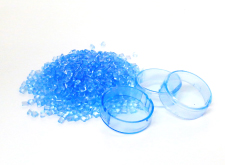・Acrylonitrile butadiene styrene (ABS)
・Polypropylene (PP)
・Polyethylene (PE)
ABS is hard, and most common plastic. PP is soft and white. PE is often used to make bottles and food containers. These plastics cost low and easy to use.
Techno-Labo is a company which supports the development of plastic products by design, mechanical engineering, prototyping, and low volume production.
Properties of plastics affect not only a product function, but also appearance, cost, manufacturability, failure rate, recyclability, and so on. Leave material selection to Techno-Labo since we consider the various factors and select the best material for your product.
There are many types of plastics. Selection the right plastic is quite critical for functions, use environment, application and appearance quality of the product.
Materials have a chemical name and an abbreviated name that is written in 2 or 3 letters.
Some materials are called with trade names.
For instance, the best-known manufactured polyamide is usually called Nylon.

ABS is hard, and most common plastic. PP is soft and white. PE is often used to make bottles and food containers. These plastics cost low and easy to use.
PC is extremely impact resistant, so it is used to make police riot shields. The problem is the toughness of coloring due to its original transparency. PVC is an inexpensive material, but not popular because of rumor on a dioxin emission. PA is also hardly used due to the high cost.
PMMA is the most popular. Total light transmittance is higher than 90%, and it has a high scratch resistance. A material that is a mixture of PMMA and rubber is widely used to recover fragileness of PMMA.
PC has high transparency and hardness but easy to get scratches. ABS and PVC are less transparent than the others.
PC and PET are relatively reasonable. PA, PPS, and PBT are categorized as engineering and super engineering plastic. These are a little expensive.
Some plastics are widely sold as fiber-reinforced grade. Those are reinforced its heat resistance by adding glass fibers or ceramics.
Cases or caps are often made with one part using a hinge structure. Due to its flexibility and strength, it won’t be cut no matter how many times you open and close it.
A self‐lubrication and abrasion resistance are necessary for parts like a gear wheel.
Most plastics are not resistant to chemicals. Acid and alkaline may easily melt products. Teflon costs incredibly high, but it is widely used and known for its high chemical resistance.
Ultraviolet rays contained in sunlight deteriorate and break most of plastics. I usually do not recommend using plastics outside. However, we can somehow use these plastics outside.
The regulations prescribe the use of plastic materials for food containers. Inspecting eluted plastic when boiled, the upper rate is set. Only the accepted plastics can be sold as a food grade.
Silicone costs incredibly high. It is relatively harmless due to the small amount of impurity, so it is becoming popular for medical applications.
"Elastomer" is the general term for thermoplastic or other soft materials. Many of them cost high. PTE is becoming more popular than rubber for its low cost of processing.
The thermoplastic elastomer has a property of softness like rubber and silicone. It is compatible with injection molding, catching attention for the medical application.
>Learn more about elastomer